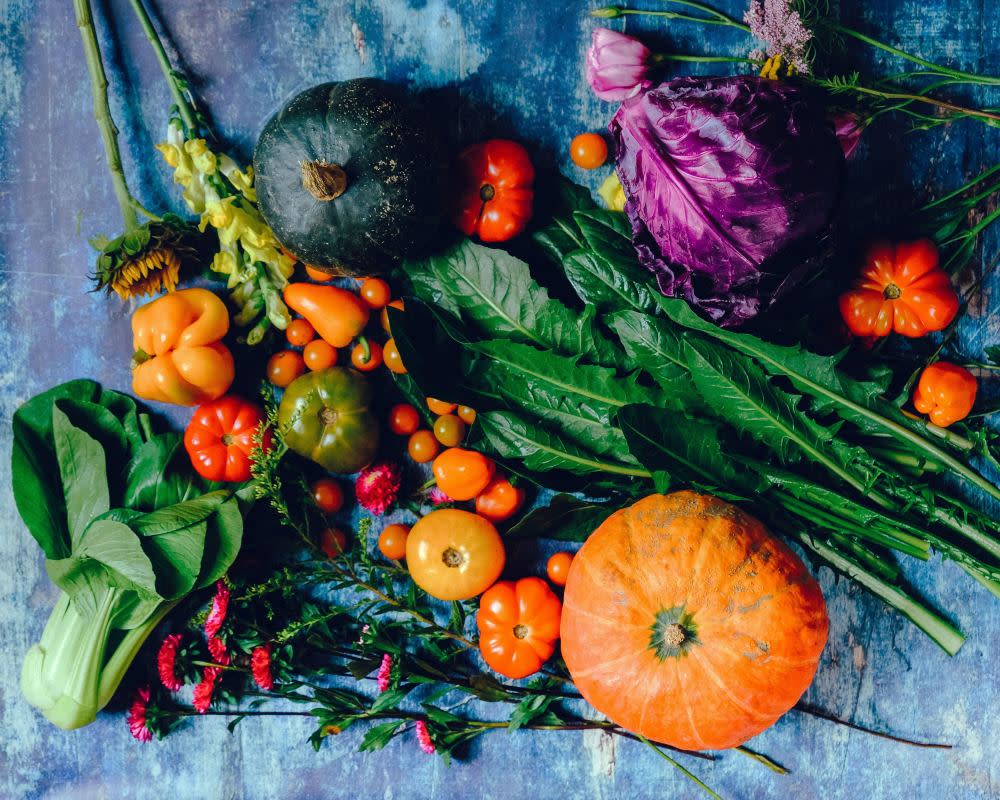The Most Important Food to Eat If You're Over 60

Healthy assortment of food
As anyone who's started aching, sagging, wrinkling or just getting tired earlier can tell you, our bodies change as we age—and so do our nutritional needs, especially as women.
Experts agree that while some dietary changes may be necessary for people over 60, there are also some key ingredients we should have throughout our entire lives to stay healthy. But the amount of those elements should increase as we get older. Here's what to know about what to incorporate into your diet if you're over 60.
Related: This Is the Diet That May Boost Your Longevity By 20%
The Most Important Food To Eat if You're Over 60
Registered dietitians we spoke with agreed that it isn't necessarily a specific food, but a specific type of food people over 60 need most in their diets: foods high in fiber, especially vegetables. (Womp, womp, we know!) Coming in second? Fruit!
"Fiber is a part of plants that isn’t fully digested—instead, it moves through our bodies picking up stray fats and sugars, feeding the healthy bacteria in our gut, and removing toxins with regular bowel movements," Molly Rapozo, registered dietitian, nutritionist and senior nutrition and health educator at Pacific Neuroscience Institute in Santa Monica, California, tells Parade. "Eating a diet adequate in fiber can help reduce the risk of heart disease and Type 2 diabetes."
Rapozo also points out that the amount of fiber you eat can ensure you have a lot of overall variety in the produce you consume, as well as other types of high-fiber goodies.
Related: People Who Live Longer Eat These Specific Foods, According to New Study
Tara M. Schmidt, lead registered dietitian for the Mayo Clinic Diet, also loves vegetables and fruit for their high water content, as many people over 60 are frequently dehydrated.
"Vegetables, fruit, whole grains, legumes, nuts and seeds all contain fiber," Rapozo notes. "The Institute of Medicine recommends that women 51 and older consume 21 grams or more of fiber per day, while men of the same age should have 30 or more grams. Choose whole foods to support your fiber needs."
And if you think you can eat junk and just pop a fiber pill, powder or gummy to compensate for a poor diet, think twice. Rapozo advises: "Supplements don't contain all the other benefits of plant foods such as antioxidants and phytochemicals."
Some of the best plant-based sources of fiber include:
Apples
Artichoke hearts
Barley
Black beans
Blackberries
Bran flakes
Broccoli
Cannellini (navy) beans
Chia seeds
Chickpeas
Kidney beans
Lentils
Peas
Pears
Quinoa
Raspberries
Split peas
Related: The Best High-Fiber Snacks
Another element of your diet that becomes more important than ever when you're over 60 is protein, so be sure to load up on high-protein foods as well.
"Proteins are the building blocks for muscles, enzymes and important hormones in our bodies. Older adults have additional protein needs to maintain muscle mass and strength, as well as bone health and immunity," Rapozo says.
According to Rapozo, you'll want to have 0.8 kg. of protein per pound of your body weight when you're younger, but that number increases as we age.
"Most healthy older adults (an exception being those with kidney disease) should consume 1 to 1.2 grams of protein per kg. of body weight daily. That’s 68 to 82 grams for a 150-pound person," she explains.
Rapozo recommends eating your protein in smaller servings at about 25 to 30 grams per meal throughout your day as opposed to consuming it all at once, because as we age, our body processes protein less efficiently.
Related: The Best High-Protein Foods
Schmidt, who's a fan of the Mediterranean diet, says it's important to be discerning about the sources of that protein because they aren't all created equal.
"Three areas of concern in the older population include protein, vitamin B12 and hydration," Schmidt says. "Although most are meeting or exceeding the recommended intake for animal products including red meat, poultry and eggs, seafood, dairy and plant-based proteins are under-consumed. A wider variety of protein sources would benefit most, as these also tend to be sources of vitamin B12."
Good sources of protein include:
Almonds
Cottage cheese
Dried beans
Fatty fish (think salmon)
Greek yogurt
Lentils
Dairy milk
Peas
Pea milks
Seeds
Soybeans
Soy milk
Split peas
Tofu
Tempeh
One otherwise healthy beverage that often isn't a great protein source? Nut milks—so check the nutrition facts on your label before counting on it to go towards your daily allotment.
Next, Find Out What Happens if You Eat Too Much Protein
